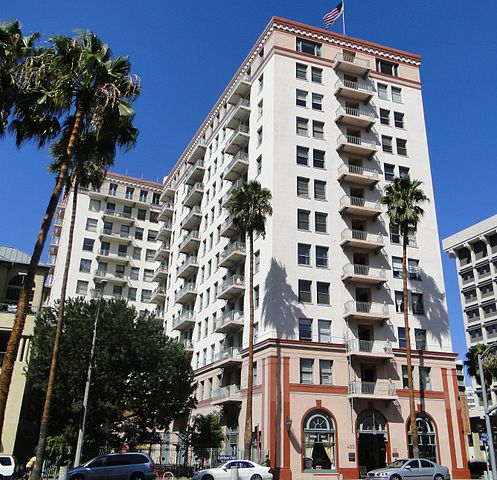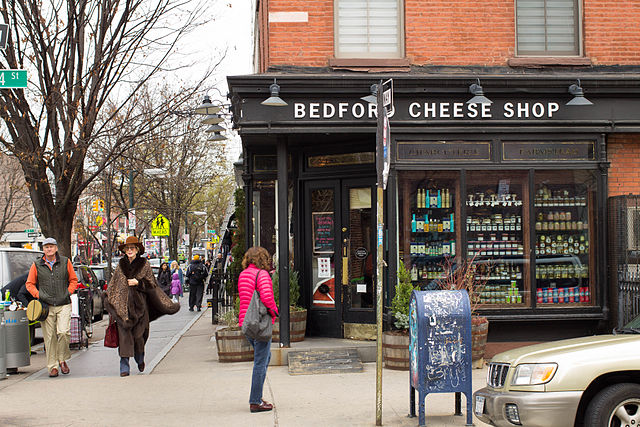Housing unaffordability is the result of artificial scarcity
Photo from Wikimedia
I would say the the majority of the United States does not have affordable housing problems, at least not to the extent that we do in the New York City or San Francisco Bay areas. Affordable housing can include low-income housing, but the two are not the same thing. When I am talking about affordable housing problems, I mean cities where you are paying around $3,000 a month for a 1 bedroom apartment.
The general rule is that your rent must be no more than 1/3rd of your income. This is not just a guideline to avoid you getting in over your head; our broker outright asked us for proof of income to see if we would qualify for the places we were looking at. Using the 1/3rd rule, $3,000 a month means you need an annual income of $108,000. The average household income in 2014 was $53,657. When you must make double the national average household income to afford to live on your own, you have an affordable housing problem.
Affordable housing is not just housing for low-income families, but also housing for those that would be considered middle and even upper-middle class in the rest of the country. Hoboken, where I live, has an affordable housing problem.
Housing Prices
Housing is a commodity that is openly traded close to market value. With a few exceptions, which I will talk about in a moment, essentially the owner is free to choose any price at which they are willing to sell or rent out their home.
Basic economics tells us that the price of a commodity is determined by supply and demand. We have a demand of people that want to live in a particular area, and that area has a supply of some number of housing units. Let's say that at a point in time a neighborhood has 50 units on the market, but there are 1,000 people that want to live there, so the supply can only accommodate 5% of the demand. In an open market, prices are eventually going to reach a point where only the top 5% of those looking for a place in that neighborhood can afford it.
We can summarize this as:
Price = Demand / Supply
When there is more demand or less supply, the price goes up. When there is less demand or more supply, the price goes down. This is basic economics.
(Out in the suburbs where developers are steamrolling subdivision projects at near construction costs, real estate operates under a completely different set of twisted economic rules to those of an established city.)
“Housing is a commodity that is in limited supply, and when there is a limited supply, the price rises to curb the demand.”
I said earlier that there are some exceptions to real estate being traded at market value, and that is rent control. Housing is a commodity that is in limited supply, and when there is a limited supply, the price rises to curb the demand. This is an essential function of the free market that ensures that in times of shortages, you never actually run out of a commodity - it just becomes very expensive. When we attempt to use price controls (rent control is a form of price control) on a commodity with limited supply, we simply run out of that commodity.
Sweden has this problem. They have tight regulations on that price (rent controls) and supply (land use regulations) of housing that they simply run out. When you simply run out of a commodity and there is no more, you have to resort to rationing. People are waiting in a queue for a decade to get their own place in Stockholm. You cannot be for affordable housing and for restricting internal intensification without being a hypocrite. I purposely said 'internal intensification' to refer to intensifying already built areas where people want to live, and not merely 'housing supply', which could be reinterpreted as cheap housing on the edge of the community for those prices out of the desirable areas.
Close to home, we see how price controls work on a commodity of limited supply; on-street parking in Hoboken. It costs $15/year to get an on-street parking permit in Hoboken, compared to $300/month in a private garage. For something that is being subsidized 0.42% of the market price, we wonder why the people complain about parking shortages at every town hall.
Lowering Demand
Photo of Williamsburg, Brooklyn. By LWYang
One way to make housing more affordable is to lower the demand to live in an area. Nationally, the United States has a shortage of quality urban places, and surplus of places people do not want to live, and a variety of places at every point in between. We have a small set of rapidly gentrifying cities where there is huge demand to live, while there are towns giving away homes and abandoned subdivisions where there is simply very little demand to live. We can lower demand in and around star American cities like New York City, Boston, Washington DC, and San Francisco by increasing the number of quality urban places people can choose from.
Regionally, we can encourage our neighbors to absorb some of the demand. Hoboken is a great place to live and a short commute to Manhattan, and that is why many people choose to live in Hoboken. If we want to lessen the demand to live in Hoboken so the city becomes more affordable, it pays to act altruistically and help our neighbors. As a city, we should support Manhattan trying to become more affordable, or our neighbors like Jersey City, Union City, Queens, or the Bronx become more desirable places. I am not saying they are not nice places today, but the nicer the region gets together, the less demand there will be to live in a select few places.
Locally, we could lower the demand to live here by messing this place up - as many cities have done across the country and hollowed themselves out. Perhaps we can bring on-street parking permits up to market rate as this would lower the demand to live here for those vocal minority that show up to town hall and complain: "I want to live in America's most walkable city, but I must be able to drive everywhere cheaply for me to stay here!" (Who do the cheap parking permits benefit anyway? Those already with one!)
Increasing Supply
The other way to make housing more affordable is to increase the supply of housing. In a free market economy without any kind of restrictions, this should naturally occur. Increasing the supply of housing (assuming you are not significantly increasing demand in parallel) will bring prices down. If a developer can make a profit because the market value of the final unit of housing is above construction costs, they will repeat, and repeat, and continue to repeat, increasing the supply of housing until milking out every last bit of profit at which point a consumer looking for a home can buy (or rent) at close to construction costs.
The decision tree of a property developer.
But what doesn't this always happen? Mostly because of burdensome regulations. One resident had to cough up $70,000 to navigate the zoning and planning board just to add a few extra feet to the back of his house, which sounds like more money than the actual construction costs of the planned extension. You should not need to get permission to do things that should be allowed by right. If you want to add an extra room or an extra floor, you should be able to just hire a contractor and start. The current system is inefficient and burdensome. You should only have to seek permission for things that are way out of the ordinary.
Why does Hoboken have zoning anyway? Why does Manhattan or San Francisco have zoning either? They are all fully built over urban areas. Zone the entire thing "mixed-use" and be done.
It is true that there is so much demand that it will encourage existing property owners and new developers to think about adding an extra floor. Height restrictions are silly - they do not support historical preservation (and this is coming from a guy who loves traditional architecture and hates most modernist stuff) and if we want to have height restrictions, it should be a dynamic height restriction based on the surrounding buildings like Chuck Marohn proposed or the Japanese system where height limits are based on street width and setbacks. The largest threat to Hoboken's character are the block-sized monoliths going up that are sterilizing our street life, and not smaller developments that are incrementally adding floors here and there.
The result of relaxing our restrictions of development will be that land values will increase - because suddenly the same parcels of land can potentially house more businesses and people. Increased land and property values would mean that the city would be flushed with more tax revenue. Construction jobs will grow as owners and developers try to increase the supply of housing. The increase in the supply of housing will mean that housing prices and rental prices will drop.
Conclusion
Unaffordable housing is the result of artificial scarcity. When there is demand to live in an area, the market should naturally respond by increasing the supply of housing. Unfortunately, we restrict this, which drives up prices, and then we try to correct a problem that should have never existed with price controls - which hurts landlords, results in rationing, and drives up the price of the remaining supply of market value housing.
“Let’s work to remove as much of the bureaucratic busywork created by zoning and planning boards as possible.”
Instead of creating problems and then addressing the symptoms, we should address the cause. Let's work to remove as much of the bureaucratic busywork created by zoning and planning boards as possible. We call ourselves a free market country, but when it comes to land use and property, we are dictatorial. This is a destructive practice that is displacing citizens, suppressing the economy, and it needs to stop.




